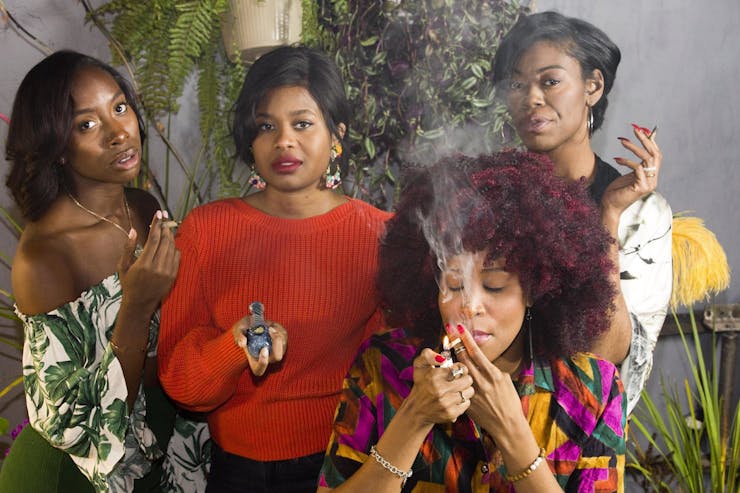There are 28 days in February dedicated to honoring the Black community, and 31 in March to honor women. But that isn’t enough. We must actively choose to support women and minorities in cannabis 24/7/365.
It’s easy to fall into a pattern of thinking that women face one set of problems while people of color face another, but it’s time to realize that there is a lot of synergy between the types of discrimination each group has faced. Often, strategies that oppress one oppress the other.
What many people fail to realize is that real solutions help both groups, because there are people who belong to both groups. If we’re ever going to address the issues that minorities in cannabis face, we have to put in the effort to learn what problems we’re dealing with.
Focus on intersectional solutions

It’s easy to get excited about new laws passing, but sometimes we have to stop and think if a new law is helping or hindering progress. For example, many people understand that the 19th amendment, ratified in 1920, guaranteed women the right to vote. Black women, however, didn’t secure their right to vote until 1965.
It’s easy to celebrate the success of new cannabis legislation, but it’s vital to assess how legalization can help all minority groups.
When we consider solutions for women in cannabis, we need to factor in solutions for all women in cannabis, including ones who may need more support due to intersectionality.
Social equity programs should be designed to provide opportunities for both women and people of color, especially women of color.
Consider a full spectrum of relationships with doctors and care

The cannabis conversation is and will always be associated with health, but different groups of people have different relationships with doctors and care. These relationships shape the ways that women and minorities engage with the plant.
Shop highly rated dispensaries near you
Showing you dispensaries nearMany women experience dismissal by their doctors when they’ve turned to them for help. People of color, specifically Black people, often harbor a deep distrust for doctors due to a legacy of mistreatment. This poses a few important questions that need to be addressed, including:
- How can medical marijuana markets (which require interactions with a doctor) better serve female and minority consumers?
- Does a doctor’s refusal to acknowledge cannabis as medicine keep women and minorities at a disadvantage?
- How beneficial would it be if women and minorities could grow weed for their own care?
All of these questions could be barriers to happy, healthy, elective cannabis consumption for women and minorities.
Help women gain access to capital and resources for cannabis businesses
Women have fought for years for equal rights to money, ownership, authority, and respect. Communities of color have had to do the same thing. Access to capital, executive roles, and ownership are large obstacles both groups often face, and it’s essential to understand that they are both consequences of good old-fashioned patriarchy.
“The money and resources companies need to survive and expand often comes from private capital markets, such as family investment offices and venture capital firms—a largely male-dominated industry.”
Marijuana Business Daily
Because the patriarchs that established our society’s rules were white men, the harm that the patriarchs produce hurts anyone that’s not white or male. This includes access to capital, wealth, and the security that comes with them. Cannabis businesses take planning, funding, and a degree of financial security that is not automatically given to women and minorities.
Without more awareness and effort around how women and minorities will get the money to start businesses, they will continue to be left out of the cannabis industry as misogyny rolls on—a devastating outlook for such a promising industry.
How to help women and minorities in cannabis

We’ve barely scratched the surface of the issues minorities in cannabis face when trying to open cannabis businesses or engage with the plant in an authentic way.
You can begin helping the cannabis industry grow more equitably by doing the following:
Support minority or women-owned cannabis businesses.
Double points if the founder of the business is both. There are organizations, growers, consultants, writers, medical professionals, and more waiting to show you their expertise.
Listen to women in real-time.
The speed that the cannabis industry is moving provides a lot of opportunities for women to show their intuition, skill, and expertise. Listen to their ideas and keep the mansplaining to yourself.
Support ethical cannabis research.
Cannabis studies are hard to come by. Cannabis studies for women? Even harder. Read up on women and weed, so you can center women’s needs.
Learn about cannabis perspectives different than your own.
Engage in conversation or research about how other cultures and people use cannabis.
Avoid respectability politics surrounding cannabis consumption.
Stop judging women and BIPOC for consuming cannabis and help us normalize cannabis care.
Help end the drug war.
Black and Native women suffer disproportionately from inflated arrest rates due to the war on drugs. Women in prison often lose sovereignty over their bodies and many struggle to receive all their rights back when they emerge. Help end the racist drug war that affects people of color more than white people.
Updated 3/272025





